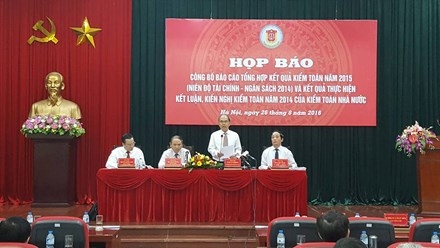 Economy
Economy
.jpg)
The State audit office of Việt Nam has announced the official figure of the 2014 public debt at more than VNĐ2.28 quadrillion (US$102.7 billion), yet hinting that it could even reach higher than that.
 |
| The State Audit Office of Việt Nam holds a press conference this morning. — Photo tienphong.vn |
HÀ NỘI — The State Audit Office of Vietnam (SAOV) have announced that the 2014 public debt stood at more than VNĐ2.28 quadrillion (US$102.7 billion), but also suggested it could be even higher.
Việt Nam’s public debt as of December 31, 2014, was equal to 58.02 per cent of the national gross domestic product (GDP) that year, SAOV told media this morning.
The public debt increased by 17.1 per cent or VNĐ333.3 trillion over 2013, according to the SAOV audit report.
Yet the audit authorities also said the finance ministry, which is in charge of tracking the public debt, had failed to provide sufficient documents and evidence for it to confirm whether the colossal debt amount of $102.7 billion was the final figure.
“Though the audited public debt index was generally in line with the Law on Public Debt Management, its content might have overlapped or failed to fully record all the government’s debts,” SAOV General Services Department Director Đào Văn Dũng said.
The official public debt amount in 2014 turned out to be slightly lower than the earlier report of the World Bank, which believed that Việt Nam’s public debt was VNĐ2.35 quadrillion.

Administrative overspending
The government in 2014 spent nearly VNĐ250 trillion to run the administrative system, the SAOV said.
This was 11 per cent in excess of VNĐ224 trillion, the amount allocated for administrative expenditure by the National Assembly.
The costs to run the administration even surpassed the budget for investment and development by at least VNĐ910 billion, thus failing to follow the principle of balanced State budget expenditure, the SAOV said.
The audit office also criticised the decision in which the central budget, which financially manages the operations of ministries and other State-level organisations, borrowed VNĐ45 trillion from the state treasury to fill the overspending gap. Such a decision was not in accordance with the Law on State Budget or any other relevant regulations.
However, it was not the first time that this had happened. The SAOV said the central budget had that kind of budget borrowing year after year, and that the total amount had already reached VNĐ120.7 trillion as of December 31, 2014.
“Meanwhile, there have been no deadlines set for payback, which will affect the liquidity of the state treasury system in the long term and possibly have a negative impact on maintaining a sustainable and balanced budget,” Dũng said.
Bad debts
Bad debts across the entire credit and banking system by the end of 2014 shot up to VNĐ145.2 trillion, a 25 per cent increase compared to the previous year, reported the SAOV.
The Vietnam Development Bank (VDB) stood out as the state-owned bank which had the highest increasing rate of non-performing loans at 68 per cent.
The bad debt situation in Việt Nam still showed little ease after years plaguing the finance system, which forced the Vietnamese Government to set up the Việt Nam Assess Management Company (VAMC) in 2013 to handle the crisis.
Credit institutions most of the time settled bad debts by selling them to the VAMC, yet the company’s performance was far from impressive.
The VAMC bought VNĐ96.4 trillion of non-performing loans in 2014, according to the SAOV, of which so far it only managed to get rid of about VNĐ627 billion, or 0.65 per cent.
The Ministry of Planning and Investment on Wednesday released a draft master plan on restructuring the economy for the next five years towards 2020, of which it proposed using the Government’s budget to settle bad debts.
The proposal sparked controversy, especially when public debts were already too high to cover any extra financial agenda.
The NA’s National Financial Supervisory Commission of Việt Nam Deputy Chairman Dương Quốc Anh said at the press conference that he had not heard about the proposal, yet said that the most plausible option to handle the bad debts might be the national budget. — VNS
.jpg)



